Kathleen Jones's Blog, page 59
January 17, 2013
Poetry and Plagiarism
 It's been an amazing week in poetry. The
TS Eliot Awards
had a record audience - established by the poet's widow, Valerie, who died recently, the Award has been gaining in significance. It's financially very valuable and so prestigious, even being nominated is an honour. This year the short list included one of my own country-men - fellow Cumbrian
Jacob Polley
, who has just published his 3rd (only his 3rd!) collection,
The Havocs.
It's on my Kindle at the moment.
It's been an amazing week in poetry. The
TS Eliot Awards
had a record audience - established by the poet's widow, Valerie, who died recently, the Award has been gaining in significance. It's financially very valuable and so prestigious, even being nominated is an honour. This year the short list included one of my own country-men - fellow Cumbrian
Jacob Polley
, who has just published his 3rd (only his 3rd!) collection,
The Havocs.
It's on my Kindle at the moment. The winner was one of the most idiosyncratic contemporary poets - Sharon Olds. I think she's one of the most important poets living today, but not everyone likes her confessional, incredibly intimate, style of poetry. Like Joni Mitchell's lyrics, her poetry is about everyone who's ever been part of her life and it's very explicit. Everything laid surgically bare. There's a brutal honesty about it that can be very moving, but also sometimes a little voyeuristic.

'A normal person wouldn’t want their experience in the public square,' Sharon said in an interview. 'But I’m not a normal person.' I've often wondered whether she learned to shock in order to get attention. But that's perhaps a mean thought - I met her once and she is a very kind and unassuming person. She has a personal grace that is very attractive. Her latest collection, Stag's Leap , is about her divorce - the moment her husband left her for another woman. I haven't read it yet, but I've just popped it onto my Kindle to read while I'm away.
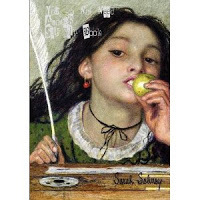
I prefer to read poetry in paperback rather than on the Kindle but have been very disappointed by the non-delivery of Sarah Salway's new collection, 'You do not Need Another Self-help Book', ordered from Amazon and lost by an Italian delivery firm who claim not to be able to find my address. 165c is right next to 165 and 164, on the main street with a post box and a big board with my name on it. Everyone in the village knows where the mad Englishwoman lives. The village shop (about 300 yds away) even knows me by name. Could the delivery man not ask? I plucked up courage (and my best pidgin Italian) to ring up the firm and was assured that it 'was at this moment being delivered'. But alas ......
This week was also the week that Christian Ward, a 32 year old poet from London, was held to account for plagiarising a number of other poets. - the number increases daily as more poets recognise their work on his website. His(!!) poems won competitions and were published in magazines and anthologies until a sharp-eyed member of the public noticed that his 'haunting' winning poem Deer on Exmoor was virtually identical to Helen Mort's poem Deer. Only the place names had been changed. The result was the withdrawal of the prize and a small item in the local paper . But then the internet took over, and the national press and then the international press, when it became clear (the power of digital communication) that he had plagiarised poets round the globe. Compare Christian Ward's poem 'The Neighbour' on p.12, with 'After Neruda' (click on Work) by Tim Dooley. Since then the blogosphere has been crackling with victims. The extent of the fraud is breath-taking! How he expected to get away with it in today's world of social media I don't know. But presumably he felt that the world of little poetry magazines was obscure enough to hide in.
It's a writer's worst nightmare; particularly if, like me, you have a retentive memory that picks up words and phrases like a magnet. I go over and over every line checking that I haven't inadvertently used someone else's words or images. Most of us acknowledge our 'borrowings' and poems sometimes become conversations between their authors. Christian Ward didn't just borrow the odd phrase - he stole the whole lot!
Published on January 17, 2013 09:53
January 14, 2013
Another Addition to the Capezzano Zoo
When we came back from England after Christmas, we noticed a cat huddled under the rubbish bins in the recycling area where we park the car. A new cat - a long-haired dark tortoiseshell. It came towards us in a friendly fashion, so not a wild-cat. But, we thought, probably belonging to a neighbour.
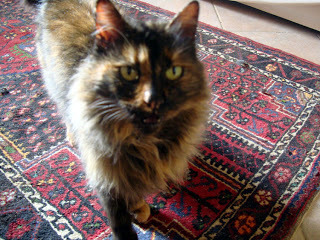 Scruffy Every day when we came back from shopping, or when Neil came back from the studio, the cat would be sitting on the side of the road, beside the path to our house and would try to follow us home. We tried shoo-ing it away - cats love second homes, but we didn't want to poach someone else's cat. Then we noticed that it was hanging around our house and getting into big fights with our two resident wild-cats. It was so desperate for food that it would risk being mauled to pieces just to snatch something from their saucers.
Scruffy Every day when we came back from shopping, or when Neil came back from the studio, the cat would be sitting on the side of the road, beside the path to our house and would try to follow us home. We tried shoo-ing it away - cats love second homes, but we didn't want to poach someone else's cat. Then we noticed that it was hanging around our house and getting into big fights with our two resident wild-cats. It was so desperate for food that it would risk being mauled to pieces just to snatch something from their saucers.
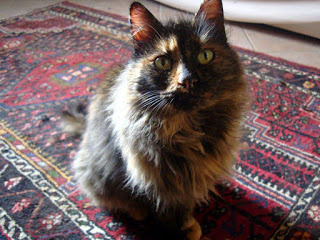 What? Me? We realised that it was starving and had either strayed, or been abandoned. Given that it was near the rubbish bins and didn't have a collar we suspect the latter. He (appears to be neutered male, but his hair is too long to be sure!) is stick thin under the long coat and thoroughly domesticated - has probably never had to fend for himself in his entire life. He skulks in the house and we feed him inside, since our two feisty females savage him the moment he goes out.
What? Me? We realised that it was starving and had either strayed, or been abandoned. Given that it was near the rubbish bins and didn't have a collar we suspect the latter. He (appears to be neutered male, but his hair is too long to be sure!) is stick thin under the long coat and thoroughly domesticated - has probably never had to fend for himself in his entire life. He skulks in the house and we feed him inside, since our two feisty females savage him the moment he goes out.
We're about to leave for New Zealand and Cambodia at the weekend and will be away for 6 weeks, so our new refugee will just have to take his chances. A friend is house-sitting and cat-feeding. Will he be there when we get back? How many more starving cats are we going to end up feeding? Neil's beginning to think that I'm something of a cat magnet!
 Scruffy Every day when we came back from shopping, or when Neil came back from the studio, the cat would be sitting on the side of the road, beside the path to our house and would try to follow us home. We tried shoo-ing it away - cats love second homes, but we didn't want to poach someone else's cat. Then we noticed that it was hanging around our house and getting into big fights with our two resident wild-cats. It was so desperate for food that it would risk being mauled to pieces just to snatch something from their saucers.
Scruffy Every day when we came back from shopping, or when Neil came back from the studio, the cat would be sitting on the side of the road, beside the path to our house and would try to follow us home. We tried shoo-ing it away - cats love second homes, but we didn't want to poach someone else's cat. Then we noticed that it was hanging around our house and getting into big fights with our two resident wild-cats. It was so desperate for food that it would risk being mauled to pieces just to snatch something from their saucers. What? Me? We realised that it was starving and had either strayed, or been abandoned. Given that it was near the rubbish bins and didn't have a collar we suspect the latter. He (appears to be neutered male, but his hair is too long to be sure!) is stick thin under the long coat and thoroughly domesticated - has probably never had to fend for himself in his entire life. He skulks in the house and we feed him inside, since our two feisty females savage him the moment he goes out.
What? Me? We realised that it was starving and had either strayed, or been abandoned. Given that it was near the rubbish bins and didn't have a collar we suspect the latter. He (appears to be neutered male, but his hair is too long to be sure!) is stick thin under the long coat and thoroughly domesticated - has probably never had to fend for himself in his entire life. He skulks in the house and we feed him inside, since our two feisty females savage him the moment he goes out.We're about to leave for New Zealand and Cambodia at the weekend and will be away for 6 weeks, so our new refugee will just have to take his chances. A friend is house-sitting and cat-feeding. Will he be there when we get back? How many more starving cats are we going to end up feeding? Neil's beginning to think that I'm something of a cat magnet!
Published on January 14, 2013 04:23
Another Addition to the Capezanno Zoo
When we came back from England after Christmas, we noticed a cat huddled under the rubbish bins in the recycling area where we park the car. A new cat - a long-haired dark tortoiseshell. It came towards us in a friendly fashion, so not a wild-cat. But, we thought, probably belonging to a neighbour.
 Scruffy Every day when we came back from shopping, or when Neil came back from the studio, the cat would be sitting on the side of the road, beside the path to our house and would try to follow us home. We tried shoo-ing it away - cats love second homes, but we didn't want to poach someone else's cat. Then we noticed that it was hanging around our house and getting into big fights with our two resident wild-cats. It was so desperate for food that it would risk being mauled to pieces just to snatch something from their saucers.
Scruffy Every day when we came back from shopping, or when Neil came back from the studio, the cat would be sitting on the side of the road, beside the path to our house and would try to follow us home. We tried shoo-ing it away - cats love second homes, but we didn't want to poach someone else's cat. Then we noticed that it was hanging around our house and getting into big fights with our two resident wild-cats. It was so desperate for food that it would risk being mauled to pieces just to snatch something from their saucers.
 What? Me? We realised that it was starving and had either strayed, or been abandoned. Given that it was near the rubbish bins and didn't have a collar we suspect the latter. He (appears to be neutered male, but his hair is too long to be sure!) is stick thin under the long coat and thoroughly domesticated - has probably never had to fend for himself in his entire life. He skulks in the house and we feed him inside, since our two feisty females savage him the moment he goes out.
What? Me? We realised that it was starving and had either strayed, or been abandoned. Given that it was near the rubbish bins and didn't have a collar we suspect the latter. He (appears to be neutered male, but his hair is too long to be sure!) is stick thin under the long coat and thoroughly domesticated - has probably never had to fend for himself in his entire life. He skulks in the house and we feed him inside, since our two feisty females savage him the moment he goes out.
We're about to leave for New Zealand and Cambodia at the weekend and will be away for 6 weeks, so our new refugee will just have to take his chances. A friend is house-sitting and cat-feeding. Will he be there when we get back? How many more starving cats are we going to end up feeding? Neil's beginning to think that I'm something of a cat magnet!
 Scruffy Every day when we came back from shopping, or when Neil came back from the studio, the cat would be sitting on the side of the road, beside the path to our house and would try to follow us home. We tried shoo-ing it away - cats love second homes, but we didn't want to poach someone else's cat. Then we noticed that it was hanging around our house and getting into big fights with our two resident wild-cats. It was so desperate for food that it would risk being mauled to pieces just to snatch something from their saucers.
Scruffy Every day when we came back from shopping, or when Neil came back from the studio, the cat would be sitting on the side of the road, beside the path to our house and would try to follow us home. We tried shoo-ing it away - cats love second homes, but we didn't want to poach someone else's cat. Then we noticed that it was hanging around our house and getting into big fights with our two resident wild-cats. It was so desperate for food that it would risk being mauled to pieces just to snatch something from their saucers. What? Me? We realised that it was starving and had either strayed, or been abandoned. Given that it was near the rubbish bins and didn't have a collar we suspect the latter. He (appears to be neutered male, but his hair is too long to be sure!) is stick thin under the long coat and thoroughly domesticated - has probably never had to fend for himself in his entire life. He skulks in the house and we feed him inside, since our two feisty females savage him the moment he goes out.
What? Me? We realised that it was starving and had either strayed, or been abandoned. Given that it was near the rubbish bins and didn't have a collar we suspect the latter. He (appears to be neutered male, but his hair is too long to be sure!) is stick thin under the long coat and thoroughly domesticated - has probably never had to fend for himself in his entire life. He skulks in the house and we feed him inside, since our two feisty females savage him the moment he goes out. We're about to leave for New Zealand and Cambodia at the weekend and will be away for 6 weeks, so our new refugee will just have to take his chances. A friend is house-sitting and cat-feeding. Will he be there when we get back? How many more starving cats are we going to end up feeding? Neil's beginning to think that I'm something of a cat magnet!
Published on January 14, 2013 04:23
January 11, 2013
Wildfires in New Zealand
Video Link: http://www.stuff.co.nz/national/8165654/Worry-over-Canterbury-blaze
It isn't just Australia where the landscape is burning up in the extreme heat - normally temperate south island New Zealand is being barbecued too. My daughter lives at Prebbleton, just outside Christ Church (having moved to a 'safer' place after the earthquakes) and was evacuated from her home yesterday with no warning. The police came to the door and they had to leave immediately and had to abandon the cow and her calf and the cat with no time to spare. Within 40 minutes the wildfire had changed from a wisp of smoke on the horizon
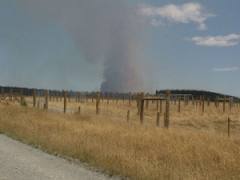
to a raging inferno with flames 65 feet high tearing across the landscape driven by strong winds.
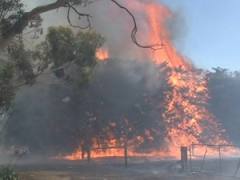
Four families in Prebbleton tragically lost their homes and livelihoods as it swept through.
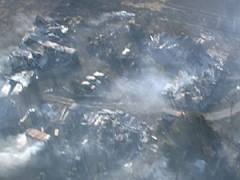 My daughter was one of the lucky ones - the blaze was halted at a road less than half a mile from her house.
My daughter was one of the lucky ones - the blaze was halted at a road less than half a mile from her house.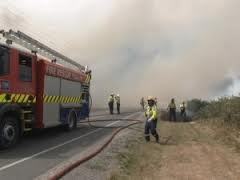
They were allowed back today, but the area is still blistering in temperatures above 30 degrees and there's a constant firewatch as the grass is tinder dry.
I feel deeply sorry for the families who lost so much in a matter of minutes and, as a mum, am still worrying about my daughter and her little family.
In a week's time Neil and I will be on our way to Christ Church and - since the last time I was there I was shaken to the bone by a major earthquake - I'm really hoping not to witness any more of nature's wildside this time!
Published on January 11, 2013 05:08
January 8, 2013
The 90th Anniversary of Katherine Mansfield's Death
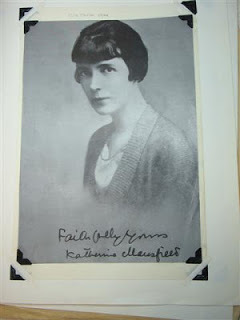 Katherine's last photographToday is the 90th anniversary of the death of Katherine Mansfield - one of the icons of 20th century literature. She died from tuberculosis, a couple of months after her 34th birthday, leaving behind 4 collections of short stories and a huge mass of unpublished journals, letters and fragments of fiction.
Katherine's last photographToday is the 90th anniversary of the death of Katherine Mansfield - one of the icons of 20th century literature. She died from tuberculosis, a couple of months after her 34th birthday, leaving behind 4 collections of short stories and a huge mass of unpublished journals, letters and fragments of fiction.She died at Fontainebleau, in Gurdjieff's Institute for the Harmonious Development of Man, haemorrhaging to death in front of her husband on the very day he had come from London to visit her.
Katherine had known she was going to die, though she preferred to ignore it and just get on with life. Her struggle to come to terms with the death sentence that was advanced TB sometimes makes harrowing reading, but her courage is humbling. Three months before she died, as she made her decision to go to Gurdjieff, she wrote in her diary:
'Risk! Risk anything! Care no more for the opinions of others, for those voices. Do the hardest thing on earth for you. Act for yourself. Face the truth.'
I don't think for a moment that she believed that Gurdjieff could cure her with his spartan regime and musical exercises. I think she went to find a safe haven, something a little like a hospice, away from the people she loved, whose grief had become a burden. It was probably, she wrote in a letter 'the soul's desperate choice'.
In Katherine's notebook she writes of what she wants. Not death and darkness and the paraphernalia of sickness; but to feel that she is walking towards life and light. She wants 'the power to live a full, adult, living breathing life in close contact with what I love - the earth and the wonders thereof, the sea, the sun. All that we mean when we speak of the external world . . . I want, by understanding myself, to understand others. I want to be all that I am capable of becoming so that I may be - (and here I have stopped and waited and waited and it's no good - there's only one phrase that will do) - a child of the sun.'
Strange things happen after the death of an author. They either sink gracefully from view, or their work develops a life of its own, marching forward into a future they could never have imagined, read by people in bizarrely different circumstances, finding meanings they never consciously intended. In Katherine Mansfield’s case, her husband, the editor and critic John Middleton Murry, was so full of guilt at the way he’d treated her when she was alive, he made it his life’s work to preserve and publish everything she’d ever written. His obsession with her ruined the lives of his subsequent wives and created a poisonous legacy for his children and grandchildren. His second wife was so desperate for his attention that she turned herself into a replica of Katherine Mansfield in order to please him. Murry really believed that their daughter was in some way ‘Katherine’s daughter’ and that’s what he insisted she be called. The damage percolated through three generations. But Murry’s obsession did mean that Katherine’s work was preserved for the future and her genius, both as a writer of fiction and a memoirist, were recognised.
 John Middleton Murry at workIt was Katherine’s private journals that I fell in love with when I was 16 - the personal journey of the young woman from New Zealand, adrift in London, lost in a quagmire of love and ambition, and negotiating those treacherous gate-keepers of literature - the Bloomsbury lions. Her courage in facing her own personal tragedies - giving birth to a still-born baby on her own in Germany as a disgraced teenager, the diagnosis of TB, her belief in love as a healing force - still moves me. Then there were her intense relationships with DH and Frieda Lawrence, Virginia Woolf, and the American painter Anne Estelle Rice. She went to parties in Paris where Modigliani and Beatrice Hastings threw each other out of windows and set alight to the apartment; attended seances with Aleister Crowley; spent evenings with Bertrand Russell and Lytton Strachey.
John Middleton Murry at workIt was Katherine’s private journals that I fell in love with when I was 16 - the personal journey of the young woman from New Zealand, adrift in London, lost in a quagmire of love and ambition, and negotiating those treacherous gate-keepers of literature - the Bloomsbury lions. Her courage in facing her own personal tragedies - giving birth to a still-born baby on her own in Germany as a disgraced teenager, the diagnosis of TB, her belief in love as a healing force - still moves me. Then there were her intense relationships with DH and Frieda Lawrence, Virginia Woolf, and the American painter Anne Estelle Rice. She went to parties in Paris where Modigliani and Beatrice Hastings threw each other out of windows and set alight to the apartment; attended seances with Aleister Crowley; spent evenings with Bertrand Russell and Lytton Strachey. This was a woman who made the most of her short life, even as she trailed like a gypsy from health resort to health resort, frantic to find a cure. Katherine was a very remarkable woman as well as a brilliant writer and her early death was a tragic loss, not only for her friends and family, but for literature.
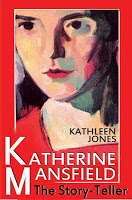
Within the last couple of weeks Neil and I have published an e-edition of my biography (originally published by Penguin NZ and Edinburgh University Press in UK). I’ve updated the biography to include new information that has come to light in the last few weeks (exciting new discoveries!) and included lots more photographs from my own archives. It's very reasonably priced at £5.10, so even the most impoverished Mansfield fan can now afford it!
Available on Amazon.co.uk
on Amazon.com
and on Kobo
Published on January 08, 2013 15:30
January 6, 2013
Pagan Customs in Capezzano
Last night was Twelfth Night - not celebrated much in northern europe apart from being the night everyone takes down their Christmas decorations. Oh, and a play by Shakespeare! But at one time Twelfth Night was celebrated more than Christmas or New Year. It has a very, very old history - the Romans called it Saturnalia and it was a bit of a pagan riot.
In this area of Italy it's still a Festa and it's the night that La Befana , the witch, flies abroad and brings a stocking full of gifts to good children - sticks or ashes to the bad, a bit like Santa Claus. La Befana may be the modern incarnation of an old goddess called Strina, who was possibly called something else by the Etruscans.
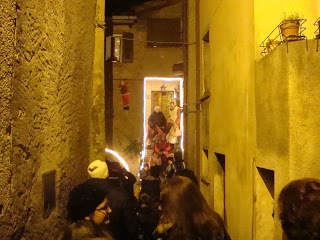 La Befana and her attendants visiting a house. In our village they have a house to house procession - one of the old ladies of the village dresses up as La Befana and is accompanied round the village by attendants and the town band. There's much laughter and drinking of hot punch, before collecting in a courtyard to sing the 'Befana' song.
La Befana and her attendants visiting a house. In our village they have a house to house procession - one of the old ladies of the village dresses up as La Befana and is accompanied round the village by attendants and the town band. There's much laughter and drinking of hot punch, before collecting in a courtyard to sing the 'Befana' song.
La Befana vien di notte,
con le scarpe tutte rotte,
ai bambini piccolini, lascia tanti cioccolatini
ai bambini cativoni, lascia cenere e carboni.
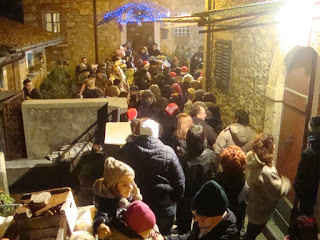 Singing in the courtyard. These days some Christian stories have become mixed with the traditional ones and La Befana is followed by the Three Kings from the nativity story, but there's no crib.
Singing in the courtyard. These days some Christian stories have become mixed with the traditional ones and La Befana is followed by the Three Kings from the nativity story, but there's no crib.
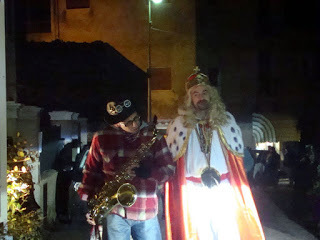
Walking along the narrow streets, carrying candles with the music and the crowds and the symbolic figures in fancy dress, feels very powerful. You definitely feel part of a community.
In this area of Italy it's still a Festa and it's the night that La Befana , the witch, flies abroad and brings a stocking full of gifts to good children - sticks or ashes to the bad, a bit like Santa Claus. La Befana may be the modern incarnation of an old goddess called Strina, who was possibly called something else by the Etruscans.
 La Befana and her attendants visiting a house. In our village they have a house to house procession - one of the old ladies of the village dresses up as La Befana and is accompanied round the village by attendants and the town band. There's much laughter and drinking of hot punch, before collecting in a courtyard to sing the 'Befana' song.
La Befana and her attendants visiting a house. In our village they have a house to house procession - one of the old ladies of the village dresses up as La Befana and is accompanied round the village by attendants and the town band. There's much laughter and drinking of hot punch, before collecting in a courtyard to sing the 'Befana' song.La Befana vien di notte,
con le scarpe tutte rotte,
ai bambini piccolini, lascia tanti cioccolatini
ai bambini cativoni, lascia cenere e carboni.
 Singing in the courtyard. These days some Christian stories have become mixed with the traditional ones and La Befana is followed by the Three Kings from the nativity story, but there's no crib.
Singing in the courtyard. These days some Christian stories have become mixed with the traditional ones and La Befana is followed by the Three Kings from the nativity story, but there's no crib.
Walking along the narrow streets, carrying candles with the music and the crowds and the symbolic figures in fancy dress, feels very powerful. You definitely feel part of a community.
Published on January 06, 2013 13:37
January 3, 2013
We're back and so is Berlusconi
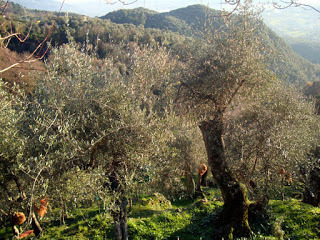 Winter sun on the olive grove
Winter sun on the olive groveThree days back from England and already the grey cloud and the freezing rain are distant memories. It’s one of those days in paradise when the sky is a serene blue, and the sea reflects the sun’s warmth like a mirror. It’s a four island day, when we can see the Tuscan archipelago - Gorgono, Capri, and Elba, as well as the mountainous bulk of Corsica on the horizon. I ate my lunch on the terrace and planted pansies under the plum tree. The first wild narcissi are just appearing in the olive grove and it really feels like spring.
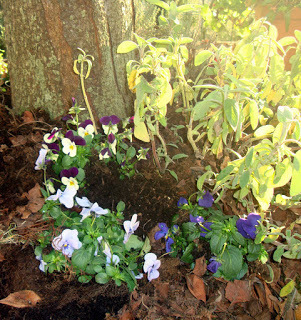
Not all is well in paradise, however. While we were away in England there was something of a political coup here in Italy. Cuts and searing taxes have made the technocrat prime minister Mario Monti very unpopular here. There has been squabbling among other parties (Italy has dozens) and some party leaders have been unseated on corruption charges. Suddenly Silvio Berlusconi (having survived corruption and under age sex charges) has arisen from the political tomb and thrown himself back in the ring, precipitating Monti’s resignation and an election in February.
 Berlusconi in a glass coffin - the sculpture that shocked the Italian art world. Berlusconi is promising to cut taxes, wave a magic wand and restore prosperity, but with a struggling Italian economy and a hidden 40% level of unemployment among young people, his rhetoric looks a bit empty. However, he has both money and power - most things here are owned or controlled by him and his family in one way or another - so anything is possible.
Berlusconi in a glass coffin - the sculpture that shocked the Italian art world. Berlusconi is promising to cut taxes, wave a magic wand and restore prosperity, but with a struggling Italian economy and a hidden 40% level of unemployment among young people, his rhetoric looks a bit empty. However, he has both money and power - most things here are owned or controlled by him and his family in one way or another - so anything is possible. Another, more personal reminder of the fragility of everything economic. Out here we rely on internet banking and last night I discovered some strange, unauthorised transactions on the account. A phone call to our bank seems to have fixed things, but it was an anxious moment. It seems as though this electronic, everything-connected world we live in, is a dangerous place.
Published on January 03, 2013 08:18
December 31, 2012
Happy New Year (with TS Eliot)
Happy New Year everyone!
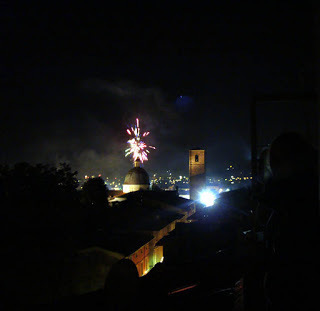
Midwinter spring is its own season
Sempiternal though sodden towards sundown,
Suspended in time, between pole and tropic.
When the short day is brightest, with frost and fire,
The brief sun flames the ice, on pond and ditches,
In windless cold that is the heart's heat,
Reflecting in a watery mirror
A glare that is blindness in the early afternoon.
And glow more intense than blaze of branch, or brazier,
Stirs the dumb spirit: no wind, but Pentecostal fire
In the dark time of the year. Between melting and freezing
The soul's sap quivers. There is no earth smell
Or smell of living thing. This is the spring time
But not in time's covenant. Now the hedgerow
Is blanched for an hour with transitory blossom
Of snow, a bloom more sudden
Than that of summer, neither budding nor fading,
Not in the scheme of generation.
Where is the summer, the unimaginable
Zero summer? . . .
What we call the beginning is often the end
And to make an end is to make a beginning.
The end is where we start from. And every phrase
And sentence that is right (where every word is at home,
Taking its place to support the others,
The word neither diffident nor ostentatious,
An easy commerce of the old and the new,
The common word exact without vulgarity,
The formal word precise but not pedantic,
The complete consort dancing together)
Every phrase and every sentence is an end and a beginning . . .
For last year's words belong to last year's language
And next year's words await another voice. . .
[TS Eliot: Little Gidding]
May you all have wonderful beginnings in 2013.

Midwinter spring is its own season
Sempiternal though sodden towards sundown,
Suspended in time, between pole and tropic.
When the short day is brightest, with frost and fire,
The brief sun flames the ice, on pond and ditches,
In windless cold that is the heart's heat,
Reflecting in a watery mirror
A glare that is blindness in the early afternoon.
And glow more intense than blaze of branch, or brazier,
Stirs the dumb spirit: no wind, but Pentecostal fire
In the dark time of the year. Between melting and freezing
The soul's sap quivers. There is no earth smell
Or smell of living thing. This is the spring time
But not in time's covenant. Now the hedgerow
Is blanched for an hour with transitory blossom
Of snow, a bloom more sudden
Than that of summer, neither budding nor fading,
Not in the scheme of generation.
Where is the summer, the unimaginable
Zero summer? . . .
What we call the beginning is often the end
And to make an end is to make a beginning.
The end is where we start from. And every phrase
And sentence that is right (where every word is at home,
Taking its place to support the others,
The word neither diffident nor ostentatious,
An easy commerce of the old and the new,
The common word exact without vulgarity,
The formal word precise but not pedantic,
The complete consort dancing together)
Every phrase and every sentence is an end and a beginning . . .
For last year's words belong to last year's language
And next year's words await another voice. . .
[TS Eliot: Little Gidding]
May you all have wonderful beginnings in 2013.
Published on December 31, 2012 09:25
December 21, 2012
Auguri to everyone - from Italy
I'm having a bit of a blog holiday at the moment - travelling to England for a few days to see my children and grandchildren, and then back to Italy again for the beginning of a new year. It's 18 months now since I came to Italy to live and I love it more every day. I realise how lucky I am to live in a town dedicated to the arts and where working in some kind of creative discipline is completely normal!
The Piazza has fewer lights this year, but the tree looks very elegant in white. The light projections on the paving and the walls are lines from poetry in different languages.
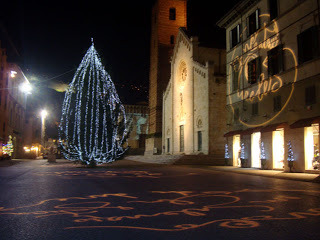
Poems are being projected onto the streets too.
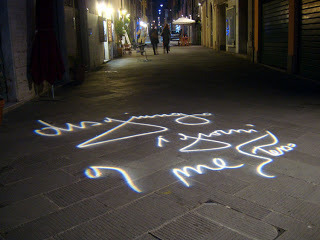
And the walls of buildings. On Sunday a Chinese poet will be reading his poems live in the Piazza - sadly I'll already be in England.
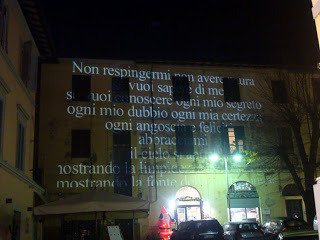
Pietrasanta's past is being commemorated too - with photographs of people who used to live and work here - many of them now dead.
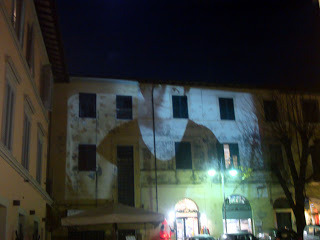
It gives a sense of the layers of history in this town - you walk around the streets and you're very aware that you're walking among the ghosts of the dead - artists and artigiani, writers and poets, priests and nuns, shop-keepers, restaurateurs, marble merchants, their wives and children. There are reminders everywhere - a tower designed by Michaelangelo, a piazza dedicated to Giordano Bruno, a niche in a wall to Carducci, a church decorated in 14th c frescoes by an unknown painter - and there are less obvious homages - a local shop-keeper has a shrine to Mussolini in the back room. The photographs of the ordinary people who once crowded these streets, complete the sensation of walking back into the past.
I wish everyone Tanti Auguri for whatever seasonal celebrations you observe and all the traditional hopes for Peace and Prosperity in the coming year. Neil and I will be having our traditional anti-commercial-christmas, somewhere out in the landscape, cowering behind a wall from the bitter December wind (and northern rain) eating mincepies and drinking coffee (probably corretto!) out of a flask. No presents, and the hills all to ourselves.
The Piazza has fewer lights this year, but the tree looks very elegant in white. The light projections on the paving and the walls are lines from poetry in different languages.

Poems are being projected onto the streets too.

And the walls of buildings. On Sunday a Chinese poet will be reading his poems live in the Piazza - sadly I'll already be in England.

Pietrasanta's past is being commemorated too - with photographs of people who used to live and work here - many of them now dead.

It gives a sense of the layers of history in this town - you walk around the streets and you're very aware that you're walking among the ghosts of the dead - artists and artigiani, writers and poets, priests and nuns, shop-keepers, restaurateurs, marble merchants, their wives and children. There are reminders everywhere - a tower designed by Michaelangelo, a piazza dedicated to Giordano Bruno, a niche in a wall to Carducci, a church decorated in 14th c frescoes by an unknown painter - and there are less obvious homages - a local shop-keeper has a shrine to Mussolini in the back room. The photographs of the ordinary people who once crowded these streets, complete the sensation of walking back into the past.
I wish everyone Tanti Auguri for whatever seasonal celebrations you observe and all the traditional hopes for Peace and Prosperity in the coming year. Neil and I will be having our traditional anti-commercial-christmas, somewhere out in the landscape, cowering behind a wall from the bitter December wind (and northern rain) eating mincepies and drinking coffee (probably corretto!) out of a flask. No presents, and the hills all to ourselves.
Published on December 21, 2012 15:30
December 17, 2012
Tuesday Poem - Clare Pollard: The Contradiction
I've been unable to get the Sandy Hook school tragedy out of my head. I think anyone with small children, or grandchildren will know that feeling - what if it had been one of mine? How do you live with the loss - the gap in your life? The poet Clare Pollard wrote a beautiful sonnet about missing children which was read at a recent church commemoration by Kate McCann. You can read the whole thing on
her website here
. I've copied the sonnet below.
The Contradiction
The absence contradicts itself:
the missing conjures what we miss.
You are not here, I’m not myself,
but still I talk to you like this.
You’re in the crowd, the news, the glimpse -
I make you there when you’re not there.
I trace your steps, I map your face,
I say your name, see you in air.
You’re all I know and so unknown.
I cannot hold you, yet I do:
please let me hold you in my head
and where you are now, hold me too.
How can you be so near and far?
You are not here. But here you are.
Copyright Clare Pollard

The Contradiction
The absence contradicts itself:
the missing conjures what we miss.
You are not here, I’m not myself,
but still I talk to you like this.
You’re in the crowd, the news, the glimpse -
I make you there when you’re not there.
I trace your steps, I map your face,
I say your name, see you in air.
You’re all I know and so unknown.
I cannot hold you, yet I do:
please let me hold you in my head
and where you are now, hold me too.
How can you be so near and far?
You are not here. But here you are.
Copyright Clare Pollard
Published on December 17, 2012 13:48



